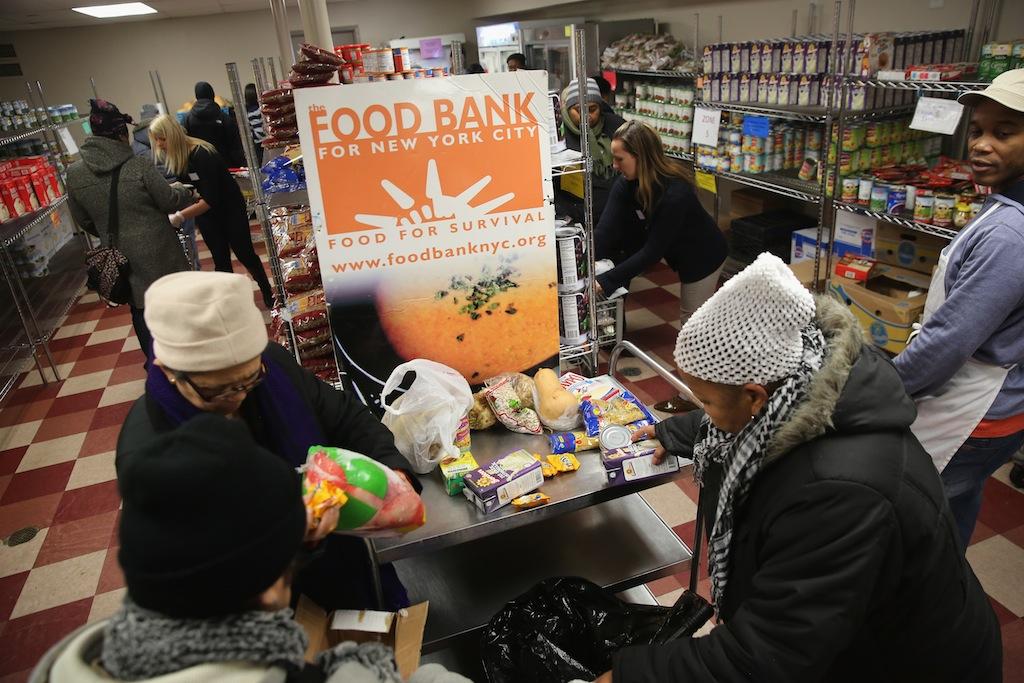Freedom and liberty: ideas Democrats should fight for in the coming elections
Harlem residents choose free groceries at the Food Bank For New York City on December 11, 2013 in New York City. The food bank distributes dry, canned and fresh food to needy residents and works with community based member programs to provide some 400,000 free meals per day throughout the city. Need increased in November when 47 million low-income people nationwide saw their food stamps cut as the federal SNAP program expired.
NEW HAVEN, Connecticut — Congressional Democrats believe, and are right to believe, that even anti-government Tea Party Republicans like what government does. Complain as they might about taxes, they value Medicare and Social Security.
So while a few red-state Democrats are going to distance themselves from the Democrats' identity as the party of governance, most others are going to carry it proudly as they gear up for the fight ahead in this year's midterm elections.
But campaigning on the idea, as New York Senator Charles Schumer suggested in a recent speech, that government can be a "force for good" is only a start. Democrats understandably want to be seen as impartial arbiters of pragmatic policy and ideologically neutral decision-making. But that won't win the hearts of workaday Americans. Democrats should declare "loudly and repeatedly" that government is necessary for the preservation of liberty.
One of the greatest achievements of 20th-century conservatism, as William F. Buckley defined it, was refashioning liberty to mean just one thing: maximum individual freedom with minimal government presence in the lives of individuals. Of course, at the time Buckley founded the National Review in 1955, the perceived threat was Soviet collectivism, which, he believed, was an evil that menaced the whole of humanity.
We live in the different world now, but government, in the minds of most conservatives, continues to mean the opposite of individual freedom. Consider the motto for Freedomworks, an influential political action group in Washington: "Lower Taxes, Less Government, More Freedom."
That wasn't always the case. In another time, the way to maximize individual freedom was to increase the role government played in the lives of individuals, and to increase the role individuals played in the life of government. The founding fathers hoped such a "principle of stakeholding," as it were, would protect the young republic from the forces of anarchy. This applied only to white property-owning men, of course, but that same stakeholding principle would later fuel demands for labor rights, civil rights and women's suffrage.
Freedom came to mean something else during the Great Depression. In that age of profound scarcity, in which workaday Americans had too little money and faced too much fear, freedom was defined in material terms. Only when a nation honors the right of every citizen to a basic standard of living can the people of that nation be truly free. That, said President Roosevelt, was what made America exceptional, and that, he said in his 1941 State of the Union address, makes us the opposite of fascist Germany and imperial Japan.
It's unnerving to consider how similar our time is to Roosevelt's.
A rash of Gallup polls suggests just how much Americans need more freedom from want, as he put it. The polls moreover reflect just how liberating programs like food stamps and unemployment insurance, as well as laws like the federal minimum wage, can be amid this ongoing economic crisis.
In one poll, almost 90 percent say the economy should be the top priority for the president and Congress; nearly 70 percent say the same for poverty and homelessness. In another, more say they are financially worse off than a year ago. Yet another showed satisfaction with the economy at its worst in 13 years: in 2001, 68 percent thought the economy was good; now it's 28 percent, down 40 points. A final Gallup survey suggests that 67 percent are dissatisfied with the distribution of wealth, a view cutting across party lines and ideologies.
Politically, the Republicans' central article of faith–that free markets are better than government–loses credibility daily. A new CNN poll finds that 66 percent of Americans want government to do something about the gap between the rich and the poor. More importantly to Democratic candidates is that the public trusts them more than they do the Republicans.
Nearly 70 percent of respondents believe the Republicans serve the rich, while only a third believe Democrats do. As economist Bruce Bartlett, a former adviser to Ronald Reagan and a Republican Party apostate, noted on his Facebook page.
"These are excellent numbers, politically, for Democrats. Only gross incompetence keeps them from capitalizing on them."
Democrats since the Clinton era have been focused on expedience rather than ideals like liberty. There are reasons for that, but in this new age of scarcity, freedom–and the lack of it–lies at the heart of the current American moment. There's only so much freedom you can have when you work all day and still can't make ends meet. When Roosevelt and the Old Left fought for Social Security, a minimum wage, workplace regulations and other policies, they didn't do it only because they were smart policies. They did it because they liberated Americans from forces beyond their control but that could inflict fear and pain without notice.
Let's hope Congressional Democrats, as they ready themselves for November, are able to overcome their "gross incompetence" and remember their freedom-fighting past.
John Stoehr is managing editor of The Washington Spectator
Every day, reporters and producers at The World are hard at work bringing you human-centered news from across the globe. But we can’t do it without you. We need your support to ensure we can continue this work for another year.
Make a gift today, and you’ll help us unlock a matching gift of $67,000!
